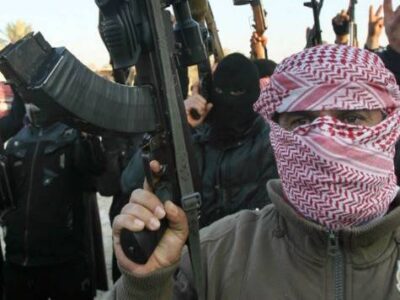
Why is Al Qaeda terrorist group attacking Turkish forces?
Al Qaeda has suffered heavily in Syria due to Turkey’s presence in Syria’s Idlib, and is looking to hit back.
On 10 March, a Turkish soldier, Osman Alp, was killed in an attack by Al Qaeda in Idlib, northern Syria. He and four of his comrades who were injured were deployed in the region as part of a force to protect 3.1 million civilians against the Assad regime, Iran and Russia.
Al Qaeda offshoots and underground networks have repeatedly attacked Turkish convoys and Turkish bases in Idlib. Most of the attacks were thwarted by the Turkish security forces or did not inflict major damage, but some have resulted in the death of several Turkish soldiers.
When the Al Qaeda terror group was established, it claimed to focus on the ‘far enemy’ – the US. So, why is Al Qaeda explicitly targeting Turkish soldiers in Syria and what are their motivations?
In recent years, Turkey has been targeted by different terror groups including Daesh, PKK/YPG, DHKP-C, MLKPD, and others. Some of them were so-called jihadists, others Marxists. However, Al Qaeda had not conducted a terror attack in Turkey since the 2003 Istanbul attacks.
Especially during the split between Al Qaeda and Daesh, Al Qaeda figures would state that Turkey has a Muslim population, distancing itself from Daesh’s terror attacks in Turkey. Parallel to the de-territorialisation of Daesh, Al Qaeda’s biggest offshoot, the Al Nusra Front in Syria, went through a significant transformation.
The branch officially cut its ties with Al Qaeda’s central leadership, united with some other armed groups in Idlib, and formed a new entity named Hayat Tahrir al-Sham (HTS). After several battles with the Turkish-backed Syrian opposition in Idlib, HTS has managed to control parts of the region.
However, a dogmatic core inside HTS rejected severing ties with Al Qaeda, split off, and founded a new group called Hurras al-Din. The relationship between HTS and Hurras al-Din remained ambivalent. HTS limited the activities of the former and drew the line for its military operations in Idlib.
At the beginning of 2020, the Russian-supported military operation to Idlib risked the lives of 3.1 million civilians and the future of the legitimate Syrian opposition. Only after the Turkish military operation, a slaughter was prevented, and in March 2020, Turkey and Russia signed a new ceasefire for Idlib.
With that, the Turkish military presence in Idlib had grown significantly. So much so that the Turkish Armed Forces emerged to be the biggest and strongest in Idlib. This new strength allowed Turkey to transform the internal dynamics in Idlib by moderating the armed groups through a strengthening of the Turkish-backed Syrian opposition and playing the pragmatic wing inside HTS against the dogmatic wing. This policy proved effective as the strengthening of the pragmatic wing inside HTS resulted in a reaction by Hurras al-Din to challenge HTS. HTS responded with war.
Long story short, Al Qaeda loyalists lost the battle and were forced to disband. This meant Syrian armed groups in Idlib decreased from a three-axis parameter to a two-axis dynamic in which only the Turkish-backed Syrian opposition and HTS remain.
The estimates are that 35-45 percent of the 1,000-strong Al Qaeda affiliate Hurras al-Din deserted Al Qaeda or laid down their weapons. The remaining 55-65 percent of Al Qaeda in Idlib were forced to go underground and change its modus operandi.
At the moment, Al Qaeda has several autonomous underground networks operating in Idlib. Their capabilities and resources have shrunk considerably. Among these Al Qaeda subgroups in Idlib is the Ansar Abu Bakr al-Siddiq Squadron. The group is made up of a former elite unit of Hurras al-Din. While their operations are secretive, it is estimated that they possess 20-100 active operators with an intelligence network of 100-400 people.
The Ansar Abu Bakr al-Siddiq Squadron has conducted several attacks against Turkish soldiers in Idlib. In each official statement, the Al Qaeda subgroup refers to the Turkish Armed Forces as the “Turkish NATO army”.
Moreover, the group tries to legitimise its terror acts against the protectors of 3.1 million civilians by arguing that Turkey is a secular state ruled by apostates. The group argues that the sole purpose of Turkey is to dismantle the ‘jihad’ in Syria and that Turkey is collaborating with the ‘criminal Russians’ and the ‘Majusi [fire worshipper/Zorastrian] Iran’.
While Turkey is the only power in the world that is using its military to protect innocent civilians in Syria, it is also the only power that hits Al Qaeda where it hurts most. The Turkish role in Syria is the antithesis to Al Qaeda – which thrives on the trauma of civilians by portraying itself as the defender of the Muslims.
As Turkey filled the void of protecting vulnerable Syrians that Al Qaeda exploited for years, the terror group has a had hard time recruiting new members and is shrinking every day. As a result, almost no Syrians remain in its ranks in Syria and nearly all members of the underground Al Qaeda network are foreigners. Al Qaeda knows that if the status quo continues, it will lose Syria forever.
To avoid this, Al Qaeda is putting all of its resources to target the Turkish Armed Forces in Idlib. By relying on Russian and Iranian pressure against Turkey, the terror group wants to increase the costs of Turkish deployment in Idlib.
The goal is to force Turkey to withdraw from Idlib and enable a new Russian-Iranian military operation in Idlib. Al Qaeda would use that to exploit the ensuing humanitarian disaster in Idlib and propagate an idea of a Turkish betrayal against the Syrian people. If Al Qaeda can achieve this, the terror group will not only flourish in Syria but use this rhetoric to regain support across the Muslim World.
Source: TRT World





